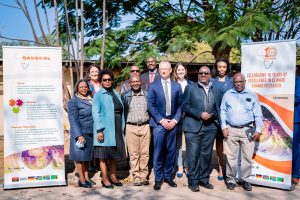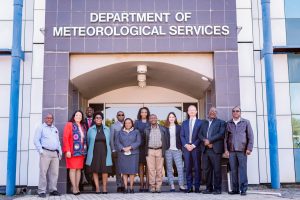SASSCAL’s 2nd Ordinary Board Meeting (OBM) held from 25 – 29 July 2022 in Gaborone, Botswana, culminated in a visit to the Botswana Node office during which the board familiarised themselves with developments at the office.
The courtesy visit on 26 July aimed at providing insights into progress regarding the operations of the Node and the construction of the Botswana Node Office building.

Pictured at the site where the construction of Botswana Node will be build: Front Row from Left: Ms Sophia Kasheeta, Ms Jane Chinkusu, Prof Yonah Seleti, Dr Karsten Hess, Mr Balisi Gopolang, Dr Joel Botai, Dr Jane Olwoch, Dr Svenja Kruse, Dr Budzanani Tacheba, Mr Kintinu Sageus and Prof Virginia Quartim
The board was informed that the Node has engaged the Department of Meteorological Services (DMS) of the Ministry of Environment, Natural Resources and Tourism on areas of mutual concern. An example of this effort was the recent proposal development for the upgrade and maintenance of the Automatic Weather Station (AWS). In this proposal, DMS was involved to ensure that their needs as the national mandated meteorological organisation are catered for.
Similarly, the Node office has been in discussions with DMS to develop a concept note that can be further crafted into a proposal on the development of a remote sensing driven evaporation tool. The evaporation data has emerged as a key need since the early stages of automation of observation due to the fact that there is no provision for the evaporation pans, which were replaced leading to data loss.
On the Dams and Reservoir Atlas of Southern Africa (DRASA), the SASSCAL board learnt about the hosting of a stakeholder workshop in November 2021. The workshop, hosted by the Botswana Node, discussed data needs for the proposed DRASA. The atlas intends to collate data about dams in the region, including their physical, hydrological, biological, and chemical properties and make this data easily accessible to the user, with the ultimate objective of improving decision making and management.
This workshop was a success as the stakeholders provided the necessary information and the data is now being deposited into the database by SASSCAL’s Open Access Data Centre (OADC). This workshop was a pacesetter as other nodes emulated it as a template to achieve similar results. The Board was also informed of two other workshops namely the scientific writing workshop in Maun, which provided skills to students and early career researchers on proposals writing that attracts funding and also a products and services workshop whose aim was to identify potential products and services that could be further developed from SASSCAL 1.0 research projects.
Additionally, two staff members – the Program Officer and the Scientific Officer, participated in the DAAD workshops for Advocacy for Research Output training to hone their skills in research advocacy, which is deemed an important area for researchers who desire to influence policy.
During the visit, the Botswana Alternate Board member, Mr Balisi Gopolang facilitated a tour of the Board to the construction site of the envisaged Botswana Node office, whose construction will commence as soon as the funds become available. The Botswana Government has availed land on which the office will be built, to which the Board was grateful. On its part, the Board offered messages of solidarity and encouraged staff to continue working hard and ensure that SASSCAL programmes are visible in Botswana. The Board further encouraged staff to develop products and services that will carry the flag of SASSCAL in Botswana, further advising them to consider enhancing the research results from portfolio 1 by developing new products and services.

Board Members at the office entrance of SASSCAL Botswana Node hosted by the Department of Meteorological Services of the Ministry of Environment




